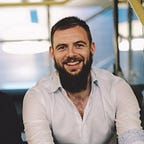Three, Sixty: With Sinead O’Brien
This is an extract from Issue 17 of SDG Alpha, my newsletter that casts an Irish lens on the world of Impact Investment, Innovation, and Sustainability. In each issue, I pose three questions on the theme of sustainability to an impact entrepreneur or innovator, to get a better understanding in sixty seconds of how they’re working to achieve the SDG targets. I’m delighted to welcome Sinead O’Brien, founder of Mungo Murphy’s Seaweed, an aquaculture business based on the shores of Galway Bay, producing a range of seaweed-based products, and doing some ground-breaking work in the farming of abalone.
If you’re not a subscriber and you want to keep getting the latest news and analysis delivered straight to your inbox every second Friday, sign up here.
On a personal level, what impacts of the climate crisis are you most concerned about?
Personally, I am most concerned about the health of our oceans, not just because I work with seawater, but because once our oceans are dead, so are humans and most life on earth. Also, if I think about it for too long, I get very sad to think about how so many marine species have lived on this planet for hundreds of millions of years and how in such a tiny window, humanity has managed to threaten their continued existence.
Which of the UN SDGs did you start Mungo Murphy’s Seaweed to address?
While I wasn’t actually thinking about the SDG at the time of creating Mungo Murphy’s Seaweed Co. my motivation was to promote and encourage sustainable consumption and production, so SDG 12.
How does your business model enable the transition to a low carbon, or more sustainable future?
I think food production is a really big area in which we need to reduce our carbon consumption and an area that also has in recent years contributed massively to the destruction of water ecosystems and biodiversity loss, through use of chemicals and fertilisers. Aquaculture can be a sustainable method of producing protein and sea vegetables especially as we enter a future where fresh water is a less plentiful resource.
We operate a land-based recirculating aquaculture system (RAS) to grow abalone (Haliotis discus hannai), a marine gastropod mollusc, a type of shellfish. This method of farming isn’t automatically low carbon as it is energy intensive, however we have a 20kw wind turbine installed to help power the majority of the farm’s electricity needs. For us, the benefit is that we don’t have to go out on boats to check on our animals and we are creating a renewable protein by growing the abalone ourselves from our own brood stock in our own hatchery. In addition, we have control over the water parameters which protects the health of the abalone. The abalone and the farm set-up are both very resilient which I think is of great importance for the sustainability of the farm.
We now live in a world where the seawater is becoming more acidic and is warming alongside continued pollution from the land. These are major risk factors for marine life. Because we are working within a confined space and in a recirculating system, we can control the water quality of our tanks. If there happened to be a red tide or another dangerous algal bloom in the bay that feeds into our tanks, we can simply turn off the sea water pump and continue to recycle our water until the danger passes. As the ocean continues to dissolve excessive carbon dioxide emissions, the seawater is becoming increasingly acidic. This is already having a negative impact on shellfish in the wild. Again, the confined space enables us to ensure that the seawater in our system does not become acidic by adding calcium carbonate to the water. We plan on incorporating sea cucumber into the whole system as they naturally release calcium carbonate and also eat the abalone waste (digested seaweed) which in turn makes the sea cucumber even healthier as they benefit from the increased bioavailability of the pre-digested seaweed. We have not yet figured out the lifecycle of the sea cucumber but this is something we are investigating. We have achieved fertilisation of sea cucumber eggs and got the larvae to pre-settlement stage but have not yet figured out the settlement stage.
